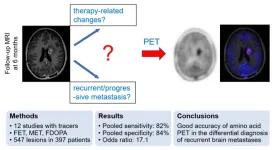(Press-News.org) **Note: the release below is a special early release from the European Congress on Obesity (ECO, Dublin, 17-20 May). Please credit the conference if you use this story**
New research to be presented at this coming week’s European Congress on Obesity in Dublin, Ireland (17-20 May) and published in the Journal of the National Cancer Institute shows that both the metabolically healthy and unhealthy ‘forms’ of obesity are associated with an increased risk of various obesity-related cancers, with the relationship stronger in metabolically unhealthy obesity. The study is by Dr Ming Sun, Lund University, Malmö, Sweden and colleagues.
Studies of how cancer is related to obesity with metabolic complications (commonly termed metabolically unhealthy obesity) or without such complications (healthy obesity) are scarce.
In this new research, the authors investigated body mass index (BMI, normal weight/overweight/obesity) jointly and in interaction with metabolic health status in relation to obesity-related cancer risk (n=23,630) among 797,193 European individuals.*
A metabolic score comprising blood pressure, plasma glucose and triglycerides (blood fats) was used to define metabolically healthy and unhealthy status, and statistical modelling was used to estimate any relationship.
The participants thus were put into six different categories – metabolically unhealthy obesity (6.8% of participants); metabolically healthy obesity (3.4%), metabolically unhealthy overweight (15.4%), metabolically health overweight (19.8%), metabolically unhealthy normal weight (12.5%), metabolically healthy normal weight (42.0%).
Metabolically unhealthy obesity, was, compared to metabolically healthy normal weight, associated with an increased relative risk of any obesity-related cancer and colon, rectal, pancreas, endometrial, liver, gallbladder, and renal cell cancer, with the highest risk estimates for endometrial, liver, and renal cell cancer (2.5 to 3.0 times increased risk).
In women, compared to metabolically healthy women of normal weight, metabolically unhealthy women with obesity had a 21% increased risk of colon cancer, a 3-times increased risk of endometrial cancer, and a 2.5 times increased risk of kidney cancer. Metabolically healthy women with obesity had a 2.4 times increased risk of endometrial cancer and an 80% increased risk of kidney cancer – but the relationship with colon cancer was no longer statistically significant.
In men, compared to metabolically healthy men of normal weight, metabolically unhealthy men with obesity had a 2.6 times increased risk of kidney cancer, an 85% increased risk of colon cancer, and a 32% increased risk of both pancreatic and rectal cancer. Metabolically healthy men with obesity had a 67% increased risk of kidney cancer, and a 42% increased risk of colon cancer, but the relationship with both pancreatic cancer and rectal cancer was no longer statistically significant. In an unusual finding, both metabolically healthy and unhealthy men with overweight (not obesity) had around a 50% increased risk of the blood cancer multiple myeloma – yet neither metabolically healthy or unhealthy men with obesity had an increased risk of this cancer.
The authors say that, among men only, the data suggest that obesity jointly with metabolic complications increases the risk of these obesity-related cancers more than expected from the sum of either risk factor individually. They say: “This has important public health implications, suggesting that a significant number of cancer cases could potentially be prevented by targeting the co-existence of metabolic problems and obesity, in particular for obesity-related cancers among men.”
The authors conclude: “This study highlights that the type of metabolic obesity phenotype is important when assessing obesity-related cancer risk. In general, being metabolically unhealthy further increased the obesity-related cancer risk, suggesting that both obesity and metabolic conditions are useful targets for prevention for obesity-related cancers.”
Dr Ming Sun, Lund University, Malmö, Sweden. T) +46 765994866 E) ming.sun@med.lu.se
Tony Kirby in the ECO Media Centre. T) +44 7834 385827 E) tony.kirby@tonykirby.com
This press release is based on poster abstract P2.027 at the European Congress of Obesity (ECO 2023). The material has been peer reviewed by the congress selection committee, and recently published in the Journal of the National Cancer Institute.
*The authors used data from the Metabolic Syndrome and Cancer Project (Me-Can) 2.0, which is a pooling of six cohorts from Norway (Oslo study 1, Norwegian Counties Study [NCS] and the Age 40-Programme [40-y]), Sweden (Västerbotten Intervention Project [VIP] and Malmö Preventive Project [MPP]), and Austria (Vorarlberg Health Monitoring and Prevention Programme [VHM&PP]).
END
Study shows how both metabolically healthy and unhealthy ‘forms’ of obesity increase risk of various obesity-related cancers
2023-05-14
ELSE PRESS RELEASES FROM THIS DATE:
Clinically relevant deficiency of the “bonding hormone” oxytocin demonstrated
2023-05-14
The hormone oxytocin is important for social interaction and to control emotions. A deficiency of this hormone has previously been assumed in various diseases such as autism, but has never been proven. Now, for the first time, researchers from the University of Basel and the University Hospital of Basel have succeeded in demonstrating a deficiency of oxytocin in patients with a deficiency of vasopressin caused by a disease of the pituitary gland. This finding could be key to developing new therapeutic approaches.
The hormones oxytocin and vasopressin are produced in the same area of the brain ...
Addiction scientists seek to better understand cocaine use disorder: ‘Stimulants are coming back’
2023-05-14
Nearly 2 percent of the U.S. population reported cocaine use in 2020, and the highly addictive substance was involved in nearly one in five overdose deaths, according to the Centers for Disease Control.
In Virginia, the number of cocaine-related overdoses has been increasing since 2013, with 968 fatal overdoses in 2022, according to preliminary data from the Virginia Department of Health, a 20 percent increase over 2021. Of those, four in five included fentanyl — prescription, illicit or analog — a driving force behind the fatalities.
Researchers at the ...
University of Kentucky physicians push for standard-of-care opioid treatment for incarcerated patients
2023-05-13
In a recently published commentary, UK HealthCare physicians call for standard-of-care treatment for opioid use disorder (OUD) among patients who are incarcerated.
The viewpoint article by Anna-Maria South, M.D., Laura Fanucchi, M.D., and Michelle Lofwall, M.D., published in JAMA April 24 highlights the barriers to initiating medication for opioid use disorder (MOUD) among people who are incarcerated.
For patients with opioid use disorder, medications such as buprenorphine and methadone are considered by the medical community as standard of care treatments, as they alleviate withdrawal symptoms, reduce cravings and pain, ...
Fear of childbirth exacerbated by the COVID-19 pandemic
2023-05-13
The COVID-19 pandemic exacerbated fear of childbirth among pregnant people in the U.S., according to a new Dartmouth study.
The researchers were particularly interested in understanding, from a U.S. context, which factors predict childbirth fear and how the pandemic has affected this fear and birth outcomes. The findings are published in Evolution, Medicine, and Public Health.
"Our results showed really high rates of childbirth fear in our sample," says first author Zaneta Thayer '08, an associate professor of anthropology at Dartmouth. "Since there's no pre-pandemic U.S. data, we cannot compare our data to that context but we know that ...
Restoring control to a particular brain region may help to prevent return to use of opioids
2023-05-13
A team of neuroscientists at the Medical University of South Carolina (MUSC) has identified changes in the activity of brain cells known as pyramidal neurons, which contribute to drug seeking in a preclinical model of opioid use disorder. After access to heroin was stopped, these neurons became more excitable. The activity of these neurons was restored to normal by blocking the enzyme protein kinase A (PKA). Inhibiting this enzyme also reduced opioid-seeking behavior. Jacqueline McGinty, Ph.D., professor of neuroscience, and Saurabh Kokane, Ph.D., a postdoctoral scholar in McGinty’s laboratory, recently published their team’s findings in the Journal of Neuroscience.
The risk ...
Stress hormone during pregnancy may improve early language development in children
2023-05-13
High levels of the stress hormone cortisol during the third trimester of pregnancy may improve speech and language skills in the first 3 years of a child’s life, according to research presented at the 25th European Congress of Endocrinology in Istanbul. The findings help researchers further understand the role cortisol plays in both fetal and child development.
Language development during early childhood can indicate how well a baby’s nervous system was developed in the womb. Prenatal exposure to cortisol – a steroid hormone that helps the body respond to ...
Steroids linked to long-lasting heart disease risk and worse quality of life
2023-05-13
Anabolic steroids not only can cause serious side effects during use, such as heart failure and depression, but can continue being harmful years after stopping, according to two studies presented at the 25th European Congress of Endocrinology in Istanbul. These studies, supported by the Novo Nordisk Foundation, were carried out by researchers from the Copenhagen University Hospital Rigshospitalet who investigated the impact of anabolic steroids in former users.
Anabolic steroids – synthetic hormones ...
Low levels of vitamin D linked to long COVID
2023-05-13
Long COVID risk has been found to increase with low levels of vitamin D, according to research presented at the 25th European Congress of Endocrinology in Istanbul. The findings suggest that individuals should have their vitamin D levels checked after COVID-19.
Also known as post COVID-19 syndrome, long COVID is a new condition in which the effects of COVID-19 last for more than 12 weeks after contracting the initial infection. Studies have shown that it affects 50-70% of patients previously hospitalised for COVID-19, yet very little is known about the condition. One risk factor for worse outcomes for hospitalised COVID-19 patients, such as intubation and mechanical ventilation ...
Accelerated delivery of transcranial magnetic stimulation is safe and effective
2023-05-12
May 12, 2023 — Accelerated schedules for repetitive transcranial magnetic stimulation (rTMS) can be offered to patients experiencing treatment-resistant major depressive disorder (MDD), a group of clinician–researchers and neuroscientists have concluded. The group cautions that such treatment should be proposed only after detailed discussion with patients about acceleration being an alternate form of rTMS scheduling, with documentation of informed consent.
The recommendations are published in a ...
Amino acid PET successfully differentiates recurrent brain metastases, reducing invasive procedures and overtreatment
2023-05-12
Reston, VA—A newly published meta-analysis indicates that amino acid PET can accurately differentiate recurrent or progressive brain metastases from treatment-related changes. A specificity of 84 percent suggests that it may reduce the number of invasive procedures and overtreatment in patients who in fact experience treatment-related changes. This research was published in the May issue of The Journal of Nuclear Medicine.
Brain metastases occur in 20 to 40 percent of all cancer patients and are most likely ...


